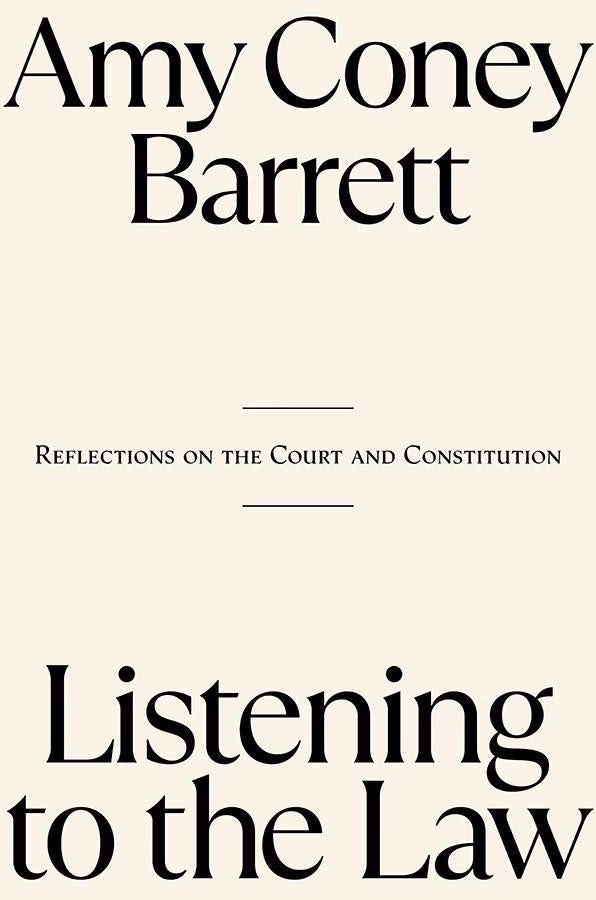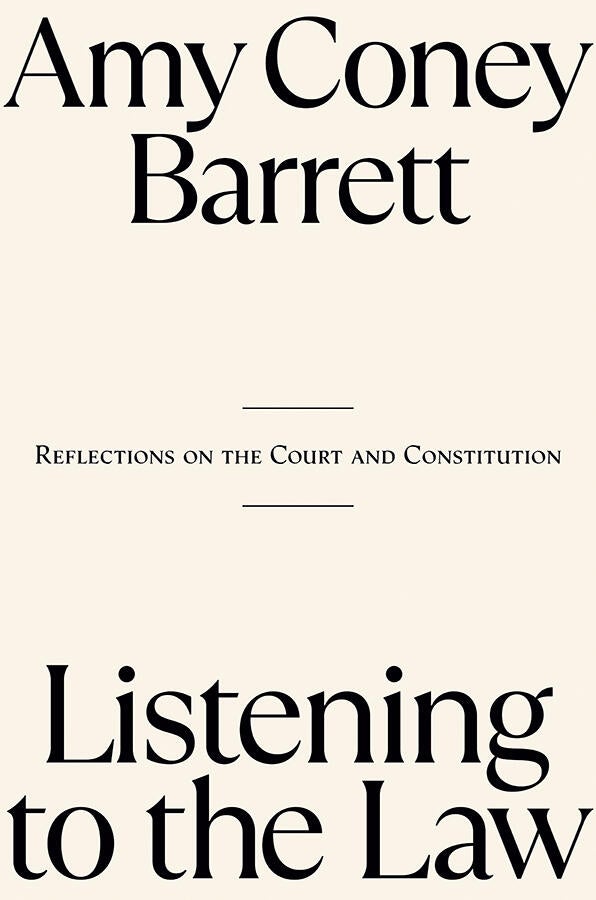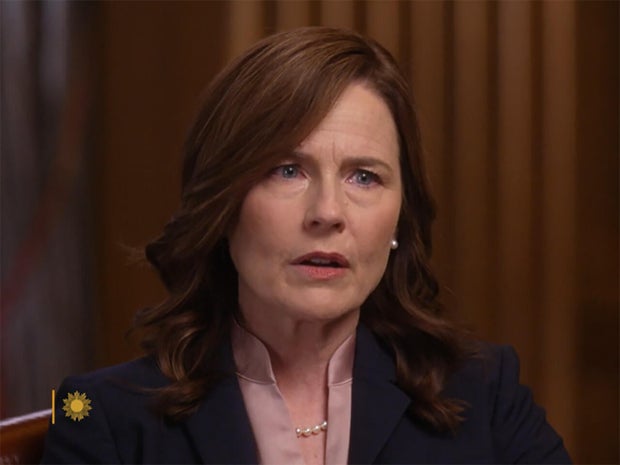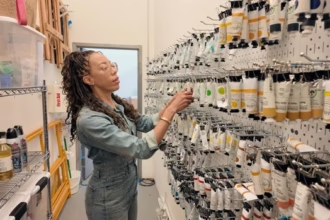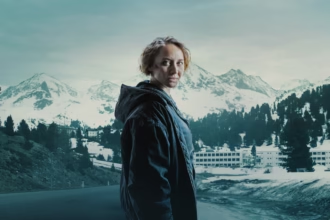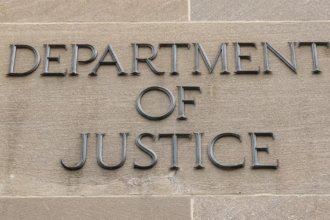Amy Coney Barrett had been teaching full-time for nearly two decades, at Notre Dame’s campus in South Bend, Indiana, until she was selected by President Donald Trump, in 2020, to serve on the Supreme Court. Now, she’s traded the classroom for the courtroom, although she continues to teach a weeklong seminar on Constitutional Law.
In her first television interview since she filled the seat left by the late Justice Ruth Bader Ginsburg, Barrett was asked whether she believed the Court has shifted to the right. “I think shifting to the right, or shifting to the left, I think those are other people’s labels, and that’s other people’s game,” she said. “I don’t think of it that way. You know, I just decide the cases as they come. I’ve been criticized by both the right and the left.”
Justice Barrett’s legal philosophy and personal story are the focus of her new book, “Listening to the Law,” out on September 9. In it, she writes that, for her, the past five years have not been easy since joining the Supreme Court: “I’m happiest with my old friends who knew me before I became Justice Barrett, and I am wistful when we’re back in South Bend.”
Sentinel
But she does not regret joining the High Court. “No, I don’t regret it,” she said. “And I think it’s really important work, and I’m proud to serve. And we do have a good life in Washington, and we have friends in Washington. But there is something nice about our old life.”
Observers at the Supreme Court describe the 53-year-old mother of seven as “the most influential justice” on the court today. Among the most notable instances of that was her vote to overturn Roe v. Wade in the 2022 Dobbs decision, which overturned nearly 50 years of precedent surrounding the right to an abortion.
For the minority’s dissent, Justices Stephen Breyer, Sonia Sotomayor and Elena Kagan wrote:
“[T]he Court may face questions about the application of abortion regulations to medical care most people view as quite different from abortion. What about the morning-after pill? IUDs? In vitro fertilization? And how about the use of dilation and evacuation or medication for miscarriage management?”
Asked whether she sees those issues coming about now as a result of Dobbs, Barrett replied, “Those are issues inherent in medical practice. And sure, they surround pregnancy care and the care of women. And those are issues that are left now to the democratic process. And the states are working those out. We have not had those cases on our docket.”
But, Barrett added, “Dobbs did not render abortion illegal. Dobbs did not say anything about whether abortion is immoral. Dobbs said that these are questions that are left to the states. And all of these kinds of questions – decisions that you mention that require medical judgments – are not ones that our Constitution connects to the courts, you know, to decide how far into pregnancy the right of abortion might extend. You know, the court was in the business of drawing a lot of those lines before, and what Dobbs says is that those calls are properly left to the democratic process. And the states have been working those out. There’s been a lot of legislative activity and a lot of state constitutional activity since the decision in Dobbs was rendered.”
For some, Dobbs raised concerns about the future of other rights. In an appearance on the Raging Moderates podcast last month, former Secretary of State Hillary Clinton predicted that the Court “will do to gay marriage what they did to abortion.”
Barrett said, “Well, I think people who criticize the Court or who are outside, say a lot of different things. But again, the point that I make in the book is that we have to tune those things out.”
She also notes in her book that the rights to marry and engage in sexual intimacy, to use birth control, and to raise children are, in her words, “fundamental.”
“Yes,” Barrett said. “Again, I’m describing what our doctrine is. And that is what we’ve said.”
Ruling on Trump’s policies
At issue now: cases on the “emergency docket,” challenging Mr. Trump’s executive orders. The nation’s highest court has routinely allowed the president’s policies (including on immigration and mass layoffs of federal workers) to temporarily proceed.
Barrett was asked to respond to Court observers who say that Mr. Trump is pushing the boundaries of executive power, even overreaching, and that the Supreme Court is not providing an adequate check on that.
“The Supreme Court, you know – and I can speak for myself and the way that I make these decisions – it’s not our job to survey and decide whether, you know, the current occupant of an office in this particular moment is, you know, to form a political view. You know, that’s the job of journalists, that’s the job of other politicians, or that’s the job of the people. But our job is to decide these legal questions.
“And so, in the cases that we’ve decided, what I can say, and what I try to explain in the book, is that we’re trying to get the law right,” she said.
One White House policy that has faced pushback from federal courts is the president’s deployment of National Guard troops in U.S. cities, such as Los Angeles and Chicago. On August 26, Mr. Trump said, “Not that I don’t have – I would – the right to do anything I want to do. I’m the president of the United States. If I think our country is in danger — and it is in danger in these cities — I can do it.”
Asked if she thought the president is right when he says he has unlimited power to deploy the National Guard in any state, Barrett replied, “So, we don’t have any cases pending before us that I’m aware of. I would not be surprised if there are some cases pending below. And so, I can’t answer that question. But actually, this is a good opportunity for me to say why I can’t answer that question, because it’s something I cover in the book. Any particular legal issue, I mean, I might be sitting there with my kids and watching TV, and I might have an idea about it. But if I’m going to decide something as a judge, it really has to happen in the context of a particular case, because judges have to approach things with an open mind on a specific set of facts. We read briefs. I listen to oral argument. I talk to my law clerks. I write out notes. I look at the cases. I talk to my colleagues. And at any step of that process, I might change my mind from my initial reaction. In fact, I often do.
CBS News
“And so not only should I not, but I don’t think you would want me to be in a position where I would just shoot from the hip and say, ‘Oh yeah. I think that’s constitutional,’ or, ‘Oh no. I think that’s not.’ That really kind of the opposite of the judicial rule,” she said.
“But you are a scholar of the Constitution,” O’Donnell said, “so I do also want to ask you, do you believe that the power to impose tariffs is something the Constitution gives to the president, or is that left to Congress?”
“Ugh, and I have to give the same answer again, because that one actually is pending in the courts, and we may well (dare I say likely will) see that case,” Barrett replied. “And so, same thing goes. You know, that’s the kind of thing that’s a wait-and-see. I’m not trying to hide the ball. And I’m sure that not only you, but probably others would be interested in, you know, what I think about that question. I don’t know what I think about that question yet, I can honestly say. You know, stay tuned. If that case comes before us, and after I dive in and read all the relevant authorities, then I’ll draw a conclusion.”
It’s that philosophy that makes Barrett the most closely-watched justice in this upcoming term – and for years to come.
Reflecting on her lifetime appointment, Barrett laughed, “Well, while I do feel older by the day, I haven’t gotten so old I’m actually thinking about retirement just yet.”
WEB EXCLUSIVE: Watch an extended interview with Justice Amy Coney Barrett (Video)
READ AN EXCERPT: “Listening to the Law” by Amy Coney Barrett
In this excerpt from the Supreme Court Justice’s memoir, Amy Coney Barrett writes of the decision she and her family made to “burn the boats” upon being asked to serve on the High Court.
For more info:
Story produced by Julie Morse. Editor: Remington Korper.


